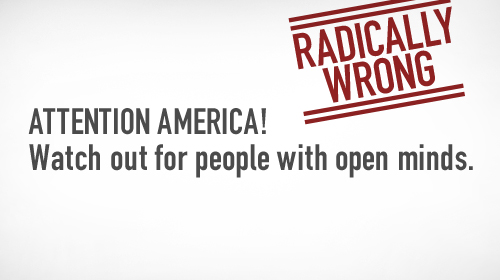
Despite evidence to the contrary, the government continues to embrace a theory that adopting radical ideas is a first step toward terrorist violence. Based on this discredited model, "preventive" policies are being pursued, resulting in discrimination, suspicionless surveillance of entire communities, and selective law enforcement against belief communities and political activists. The following is the third installment in the ACLU blog series "Radically Wrong," which highlights counterterrorism policies that are not only ineffective, but also undermine our constitutional rights.
Earlier this month, the White House about its commitment to empower "members of the public to protect themselves against the full range of online threats, including online radicalization to violence," and announced the creation of a new interagency working group for that purpose. The working group will coordinate the government's efforts and develop plans—alongside private industry—to "implement an Internet safety approach to address online extremism."
The White House initiative raises a basic question: Is it appropriate for the government (in cahoots with private industry) to repurpose programs that, for instance, urge consumers to install anti-virus software and protect their credit card information into something that warns them against "bad" ideas?
My colleagues Mike German and Dena Sher have written at length about how "radicalization" models assume, falsely, that you can predict future violence from present sympathies for "radical" or "extreme" beliefs. As they point out, numerous studies have shown that (1) there is no simple link between the adoption of an ideology and violent action; and (2) that it's exceedingly difficult to craft a coherent model of the kinds of ideologies or beliefs that could be expected to lead to violence (largely because of the manifold and ever-shifting nature of ideas themselves).
By ignoring these studies, efforts to identify a "radicalization" process focus on normal, everyday speech and association, generally with an ethnic or religious flavor. They do so because the whole purpose of a radicalization model is to provide a non-psychic ""—a way to see into the future under the false presumption that thoughts lead directly to action. So, mosques, hookah bars and book stores become alleged "terrorist incubators." Wearing Islamic clothes, growing a beard, joining community groups all become supposed indicators of future terrorist activity—even though thousands of people do these things and never commit a single criminal or violent act.
Dollars to donuts, the same thing is going to happen here. The White House announced that the federal consumer protection portal as well as the Department of Homeland Security's titled "countering violent extremism" (which the government refers to by the catchy acronym "CVE") would begin carrying precautionary "CVE information." Crucially, even though CVE includes the word "violent," the initiative has little to do with stopping actual conduct, and much more to do with urging the public to be alert for and report purely expressive or associational activity. The White House also announced that it will work with industry to adapt internet safety measures that help prevent fraud and identity theft to likewise address "online extremism"—whatever that means. There is no detail on what information will be posted to the government's sites, or how these industry partnerships would work.
The problem, of course, is that countering "extremism" is a completely different animal than consumer protection. OnGuard Online, right now, hosts innocuous tips for getting rid of malware, keeping your kids safe from online fraud and securing your home network. It's a radically different proposition—no pun intended—to use the site to prevent someone from developing sympathies for Communist Party USA (slogan: "Radical Ideas. Real Politics."). For the latter, you literally have to warn consumers to be wary of exposure to particular ideas, arguments and opinions.
Accordingly, any government move to use consumer education tools to counter violent extremism will involve very uncomfortable judgment calls about particular groups, individuals, ideas and internet phenomena. Will it warn against people who link to certain blogs? What about people who retweet messages from a group like Hamas, which a "foreign terrorist organization" with a "paramilitary arm" and which is also a political organization? What about an individual who "friends" a conservative organization that refuses to recognize the legitimacy of the federal government? Will the program follow the hopelessly amorphous and debunked approach of a New York Police Department , "Radicalization in the West," where, for instance, the second supposedly "distinct" stage in the so-called process of "radicalization" involves "a cognitive opening, or crisis, which shakes one's certitude in previously held beliefs and opens an individual to be receptive to new worldviews"? How would the government even draft that as language for OnGuard Online? Attention America: watch out for people with open minds?
The simple fact is that we all have a First Amendment right to think "dangerous" thoughts. We do not have a First Amendment right to do violent things. Many people have dangerous thoughts, but never do violent things, and it's virtually impossible to systematically predict which "dangerous" thinkers are going to end up engaging in violence or criminal activity. The Constitution strictly limits restrictions on "radical" speech, and even speech that advocates violence, for precisely this reason. As the Supreme Court at another point in our history when the government sought to suppress and literally criminalize ideas:
[T]he mere abstract teaching of Communist theory, including the teaching of the moral propriety or even moral necessity for a resort to force and violence, is not the same as preparing a group for violent action and steeling it to such action.
By dressing up the CVE initiatives as consumer education and internet safety programs, the government is trying to indirectly suppress speech that it can't directly censor. It should, once and for all, reject these misguided programs.
Previous posts in the "Radically Wrong" series:
Part 1: A Counterproductive Approach to Counterterrorism
Part 2: Misstated Threats - Terrorism isn't an American-Muslim Problem
Learn more about counterrorism and other civil liberties issues: Sign up for breaking news alerts, , and .

